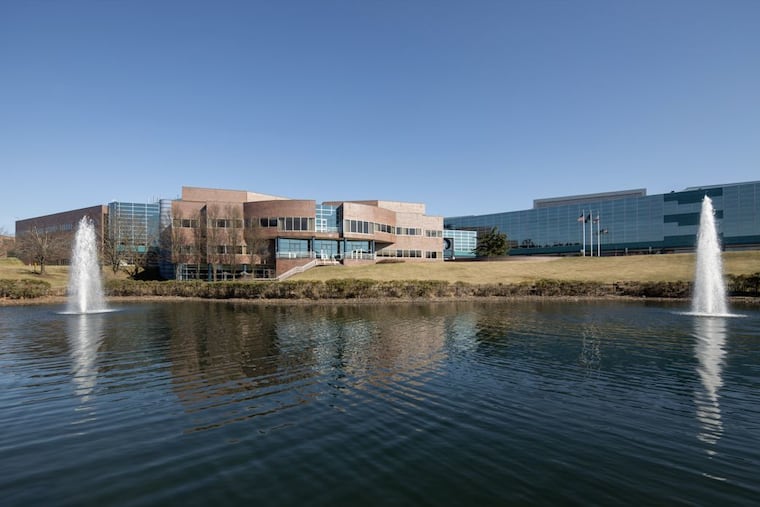Penn Medicine gene therapy unit moving into former GSK plant in King of Prussia
Penn’s bold suburban push comes amid a University City lab-space crunch. One firm called University City one of 12 “star submarkets” nationwide that have maintained high rents and occupancy levels.

The University of Pennsylvania’s gene therapy program has signed a 150,000-square-foot lease at a former GlaxoSmithKline property in King of Prussia, as the quick-growing unit’s need for specialty lab space outpaces what’s immediately available closer to home in University City.
Penn’s gene therapy program will use the space at the former Montgomery County pharmaceutical plant for part of its expanding research into genetic medicines for rare diseases, including ultrarare ailments known as orphan diseases, as well as infectious diseases such as COVID-19, according to a release on Tuesday from Penn Medicine and MLP Ventures, which owns the property.
The lease is a boon to MLP chief J. Brian O’Neill, a Main Line developer who has been promoting the 411 Swedeland Rd. property as part of a planned network of lab and office buildings occupied by life-science tenants, dubbed Discovery Labs.
Penn apparently had an immediate need for a large amount of lab space with features such as high ceilings and advanced ventilation and plumbing systems that — within the Philadelphia region at least — only the former drug plant could satisfy, said Hether Smith of commercial brokerage Savills, who was not involved in the deal.
“If you want to do a lot of research fast, fast, fast,” she said, “the only real existing lab space right now is that former GSK space.”
Work at the new facility will focus on a key element of gene therapy known as vectors, which are modified viruses used to introduce new genetic material into patients, Penn and MLP said. Activities will span from early research to applications for clinical trials, including large-scale vector production.
“The past few years have been a pivotal time in the development of gene therapies, and our new space at Discovery Labs will propel us even further,” said James M. Wilson, the Penn program’s director. “With additional state-of-the-art equipment and increased operational capabilities, we are well-positioned to enhance the design and execution of our innovative, transformative therapies.”
The gene program is currently located at Penn’s Translational Research Center near 31st and Walnut Streets and at 3711 Market St., which was built as part of the University City Science Center and is now part of Wexford Science & Technology’s uCity Square complex.
Parts of the program will remain in those locations even as the vector facility expands at the former GSK site, a Penn spokesperson said.
Penn and MLP did not respond to questions about the duration of the GSK building lease.
Gene therapy is one of the most successful sectors in Philadelphia’s fast-growing life-science industry, as companies form and expand to capitalize on research spun off from Penn and other institutions.
In a research note last month, commercial real estate firm Newmark classified University City as one of 12 “star submarkets” nationwide that have maintained high rents and occupancy levels, even as other cities’ office markets suffer from the economic impacts of the coronavirus pandemic.
It attributed that success to University City’s biomedical and life-science activity.
This activity has prompted a spate of new projects aimed at meeting surging demand for lab space. These include Brandywine Realty Trust’s Schuylkill Yards West office, lab and apartment tower, the One uCity building rising as part of the uCity Square complex and the 3.0 University Place offices that broke ground last week.
Landlords are also scrambling to retrofit existing office space to accommodate life science labs. Brandywine, for example, is turning a 50,000-square foot section of the Cira Centre tower near 30th Street Station into lab and research space, while Keystone Property Group has transformed sections of its Curtis building beside Washington Square into life-science labs and offices for such tenants as Imvax Inc. and Vivodyne.
In all, landlords are in the process of building 2 million square feet of lab space for life science tenants citywide, but it won’t be available for occupancy until late next year, according to a report last month by real estate services firm CBRE.
And tenants want space now: CBRE said that there could be enough immediate demand from users to fill 1.5-million square feet of those labs, an area nearly the size of Comcast’s newly built technology tower.
“Demand for life science space is outstripping the existing supply in University City, a trend we expect to continue,” said Jim Egan, a broker at Newmark, who was also not involved with Penn’s gene therapy deal. “The Penn transaction is an indicator that the entire region is benefiting from the research being done in our world-renowned institutions.”
Penn was represented in the deal by Joseph Fetterman of real estate firm Colliers International. MLP was represented by its in-house real estate staff.
Until now, the only known tenants at the 972,000-square-foot GSK building had been the drug maker itself, which remained at the site as a lessee, and Wuxi Biologics, a Shanghai-area-based biotechnology company. Together, the two occupy 120,000 square feet of the complex.
Drexel University’s real estate director also said earlier this year that it was considering a 300,000-square-foot lease at the building to consolidate medical researchers now spread between part of the former Hahnemann University Hospital property and a site in East Falls.
The other components of MLP’s Discovery Labs include The Philadelphia Inquirer’s former Schuylkill Printing Plant and nearby office-park buildings that O’Neill’s business bought from Liberty Property Trust.
MLP chief O’Neill said the new Penn lease “is strong validation for the incredible life science ecosystem that is emerging in Greater Philadelphia.”
“Dr. Wilson and his incredible team at Penn have helped establish Philadelphia as a leader in gene therapies,” he said. “We are deeply honored to have the opportunity to work with him and his incredible team of scientists through the expansion of their world-class research and development labs.”